
5 Strategies for Success When Teaching Online
- Subject:
- Educational Technology
- Higher Education
- Material Type:
- Teaching/Learning Strategy
- Author:
- Jacob Spradlin
- Date Added:
- 09/28/2023

5 Strategies for Success When Teaching Online
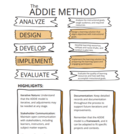
A beginner handout for becoming familiar with what ADDIE is and how each step falls in the process of Instructional Design. Learners can use as a visual/verbal reminder.
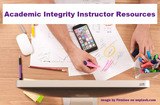
Academic cheating is a growing problem in educational institutions around the world, and it can take many forms, including plagiarism, collusion, and cheating during exams. Academic cheating can have serious consequences for students, educators, and the academic community as a whole.The Academic Integrity Instructor Resource Platform is a growing and evolving online resource designed to support and promote academic integrity among faculty members. This resource serves as a go-to platform for faculty seeking guidance, tools, and best practices to foster a culture of academic honesty and prevent plagiarism and cheating within their online, online-live, hybrid, and face-to-face, classrooms.
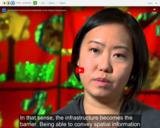
Accessibliity for students with disabilities taking online courses

This is an informational document providing an overview of Anthology Ally and its features for improving accessibility of digital course content in higher education. It covers background on accessibility regulations, a history of Anthology Ally, key terms and concepts used in the tool, and ways Ally enables engagement between instructional designers, faculty, students, and administrators to enhance inclusion. The document was created with assistance from an AI tool.

An infographic with Quick Facts on AI in higher education by Mandy Jordan, Researcher, SHSU Online
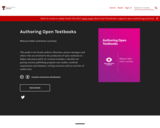
"This guide is for faculty authors, librarians, project managers and others who are involved in the production of open textbooks in higher education and K-12. It includes a checklist for getting started, publishing program case studies, textbook organization and elements, writing resources and an overview of useful tools.
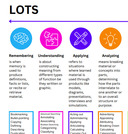
An infographic detailing the new version of Bloom's Taxonomy for digital use. Originally created by the Global Digital Citizen Foundation. Created by Ascend at Los Angeles Pacific University.
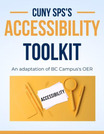
The goal of this adapted version of BC Campus's Accessibility Toolkit - 2nd Edition is to provide resources for each content creator, instructional designer, educational technologist, librarian, administrator, and teaching assistant to create truly open textbooks and online academic experiences—ones that are free and accessible for all students. The original source was a collaboration between BCcampus, Camosun College, and CAPER-BC.

A helpful checklist for instructors who find themselves suddenly shifting to online instruction.

An overview, and an example of an online course that focuses on community engagement and service learning.

The attached file is a course schedule or outline template in a Word document. It contains a table with columns for week, dates, topic, and activities/assignments. The table has rows for each week of a 15 week course, with dates, topics, and placeholder activities and assignments filled in.
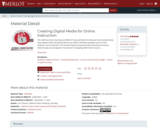
The California State University and MERLOT have partnered to showcase how and why faculty have adopted Open Educational Resources (OER) to facilitate equitable access to their students’ course materials. This Faculty Showcase represent Open Educational Practices where faculty are sharing their "know-how" for adopting OER in their courses.
These open course materials are being utilized in an Online Teaching and Learning course for graduate students by Jim Thomas at Cal State East Bay. These resources provide students with a variety of ways to engage with a variety of free materials that are available through websites, instructor created content and our library databases . The main motivation to adopt free resources is to increase student success. The learning outcomes of the course are not be covered in any single textbook and this subject matter changes rapidly. Most student access these materials through our learning management system, Blackboard Ultra.
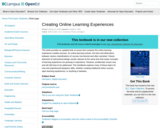
This book provides an updated look at issues that comprise the online learning experience creation process. As online learning evolves, the lines and distinctions between various classifications of courses has blurred and often vanished. Classic elements of instructional design remain relevant at the same time that newer concepts of learning experience are growing in importance. However, problematic issues new and old still have to be addressed. This handbook explores many of these topics for new and experienced designers alike, whether creating traditional online courses, open learning experiences, or anything in between.
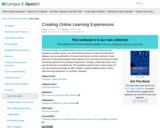
This book provides an updated look at issues that comprise the online learning experience creation process. As online learning evolves, the lines and distinctions between various classifications of courses has blurred and often vanished. Classic elements of instructional design remain relevant at the same time that newer concepts of learning experience are growing in importance. However, problematic issues new and old still have to be addressed. This handbook explores many of these topics for new and experienced designers alike, whether creating traditional online courses, open learning experiences, or anything in between.

This customizable Excel template provides a master framework to plan and organize learning activities for online courses. The template contains sheets to outline course modules, schedule weekly learning objectives and activities, plan assessments and assignments, and track student progress. Columns are provided to capture activity details like name, type, description, duration, assignments, and more. The template is fully editable so course designers can add or remove sheets as needed to match their planning process. By providing a structured planning template, this Excel file aims to help streamline the instructional design process for online learning. Use it to map out engaging and effective learning experiences for modern online courses.

An overview of Dee Fink's learning taxonomy with tips for applying it to digital learning experiences.
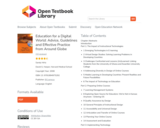
Education for a Digital World contains a comprehensive collection of proven strategies and tools for effective online teaching, based on the principles of learning as a social process. It offers practical, contemporary guidance to support e-learning decision-making, and instructional choices, as well as program and course planning, and development.
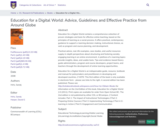
Education for a Digital World: Advice, Guidelines and Effective Practice from Around Globe

Approaching the end of an academic semester necessitates a multi-faceted strategy that encompasses academic, organizational, and technological considerations. To assist you in effectively managing this transition, we present a thorough guide geared towards facilitating a smooth end-of-semester experience.